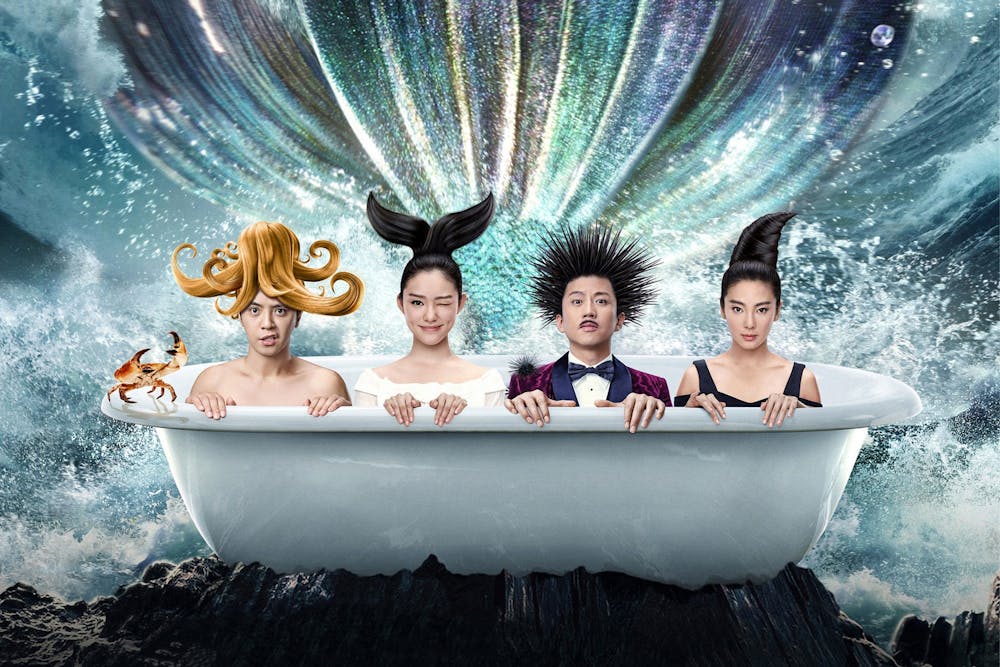SPOILER ALERT: This column contains potential spoilers about “The Mermaid.”
The Chinese film “The Mermaid人鱼” or “Mei Ren Yu” in Mandarin, was released in 2016 and broke box office records after its initial release. It is currently the ninth highest grossing film of all time in mainland China, and it was directed by Stephen Chow, a Hong Kong filmmaker best known for his work on “Kung Fu Hustle” and “Shaolin Soccer.”
Described as an eco-fable that seamlessly blends the genres of comedy, romance and fantasy, “The Mermaid” follows the Romeo-and-Juliet-esque love story between playboy businessman Liu Xuan, played by Deng Chao, and a determined young mermaid named Shan, played by Lin Yun.
Related: [COLUMN: ‘Do Revenge’ is a candy-colored, Gen Z-ified take on one of Hitchcock’s classics]
Shan captures Xuan’s heart through her quirky mannerisms and gentle, fun-loving nature, although he is oblivious to the fact that her mermaid family has sent her to seduce and kill him. The story ends, in Stephen Chow style, with a happy ending for Shan and a redeemed Xuan, who donates all his money to environmental protection.
There is a reason “The Mermaid” feels so familiar. From the climate change extremities depicted in “The Day After Tomorrow” to the fairies fighting to save their forest in “Ferngully,” many American movies also wrestle with the realities of environmental negligence.
Today, the world’s top polluters are China, the United States and India. “The Mermaid” gets straight to the point, opening with a montage of factories spouting fumes into the air, coastal birds slick with oil and machines razing down trees in the forest, all meant to remind the viewer that, while mermaids might be fiction, the world is rife with the consequences of pollution and deforestation.
The transformed character of Liu Xuan best embodies the consequences of environmental negligence. At the beginning of the movie, Xuan possesses no shortage of flashy suits, fancy cars and gorgeous young women, all vying to win his affection and share in his wealth. Worst of all, his company has lowered deadly sonar into the waters of a newly purchased wildlife habitat to reclaim land that kills Shan’s mermaid friends.
After a night with Shan, filled with amusement rides, chicken and a rendition of the film’s theme song “Invincible,” Xuan realizes that love is a much worthier pursuit than money. In the touching finale, he fights to return an injured Shan to the water, even after being pierced by bullets from his vengeful business partner and ex-girlfriend Ruolan, played by Zhang Yuqi.
The ending is surprisingly optimistic. Billionaire playboy and businessman Xuan, who is albeit of humble beginnings, donated his entire fortune to environmental protection charities. The message ties into the idea that love can conquer even the most strongly held convictions, and the reality that people are often reluctant to recognize social issues until they or a loved one are personally at risk.
Related: [COLUMN: ‘Pearl’ is an unhinged, technicolor nightmare that you won’t want to wake up from]
Chow said in an interview with chinadaily.com that he's a big fan of fairy tales.
“All my previous titles can be understood as fairy tales,” he said. “In the world of fairy tales, the evil are punished and the good see a happy ending. I buy that idea.”
“The Mermaid” provides more than a touching love story. Stephen Chow has certainly delivered a stern warning to humans, but it is not without optimism, love and a belief in the human capacity for change. We can only hope that our world may see a happy ending similar to the one in Chow’s film.






